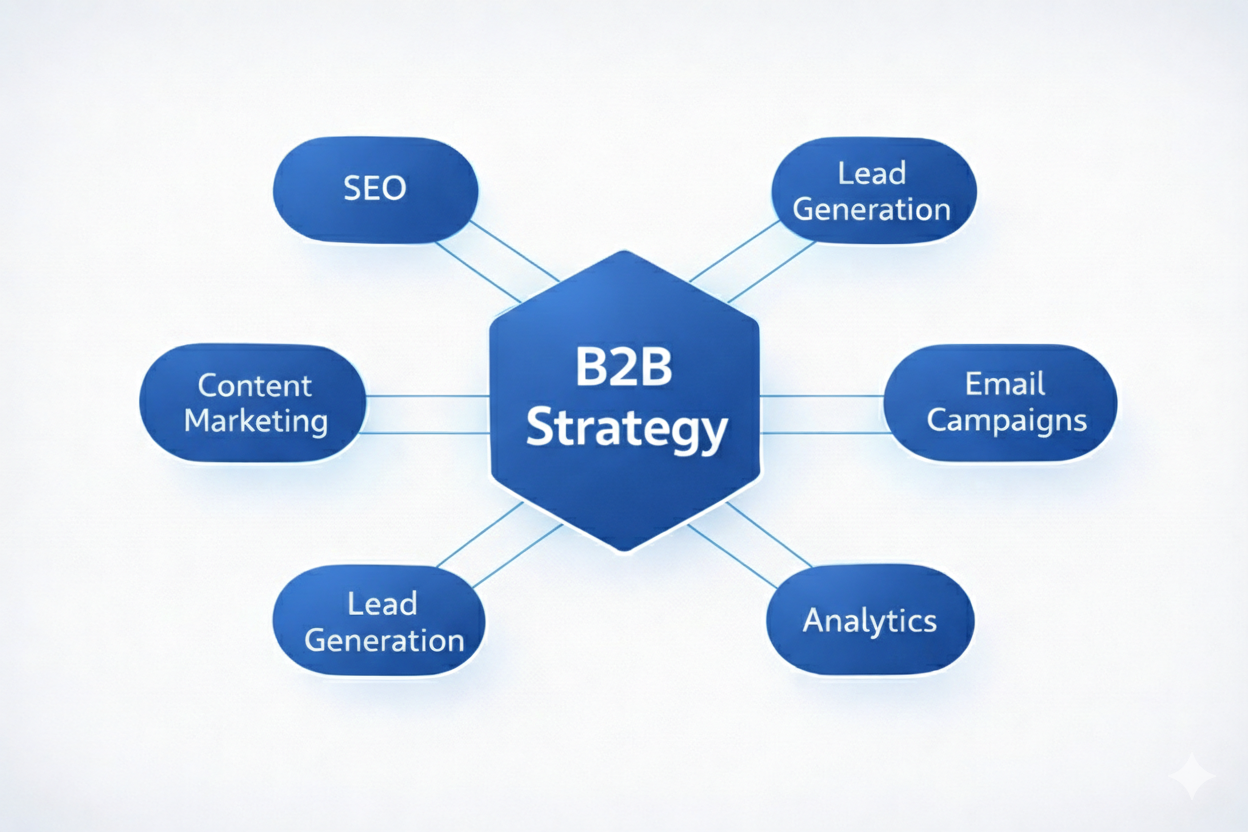In B2B sales, generating leads is rarely the difficult part, converting them is.
Many companies experience the same challenge: a high number of leads at the top of the funnel, but only a small percentage turning into real conversations or revenue opportunities. Marketing teams may celebrate an increase in lead volume, yet sales teams often find themselves saying, “These leads aren’t ready to buy.”
This disconnect happens because not all leads are created equal.
Some leads are simply browsing.
Some leads are mildly curious.
And then there is a specific category of leads who are actively exploring solutions, showing meaningful intent, and are genuinely positioned to move forward.
These are your Sales Qualified Leads (SQLs).
In B2B sales, understanding what an SQL is, how it is identified, and what role it plays in the buyer journey can significantly improve conversions, strengthen alignment between teams, and accelerate revenue.
Let’s break it down step by step.
Table of Contents
Toggle1. What Is SQL?
A Sales Qualified Lead (SQL) is essentially a potential customer who has moved beyond basic interest and is now seriously considering your product or service. They are not just browsing or casually learning, they are actively looking for a solution, and your offering fits what they need.
An SQL is someone who matches your company’s ideal customer profile (ICP), which means they come from the right industry, have the right role, and fit the characteristics of a customer who is more likely to buy. But what truly makes them an SQL is their buying intent. They are showing signs that they are ready to have a meaningful sales conversation.
For example, they may request a demo, ask for pricing, or engage with content that shows they are comparing solutions. They might revisit your website multiple times, explore your product pages, or respond positively to outreach. These behaviors signal that they are not just exploring, they have a real problem and are trying to understand how your product can solve it.
At this stage, the prospect is usually looking for clarity on things like:
- How your solution works
- How much it costs
- Whether it fits their business needs
- What results they can expect
Because they have shown strong interest and fit your customer profile, they are passed from the marketing team to the sales team, typically to an SDR (Sales Development Representative) or an Account Executive.
SQLs are important because they represent the highest-quality leads early in the sales process. These are the prospects most likely to turn into opportunities and eventually customers. When companies focus on identifying and nurturing SQLs, their sales teams spend more time with people who are genuinely ready to buy, which leads to better conversion rates and a healthier pipeline.
2. SQL’s Role in the B2B Sales Funnel
The Sales Qualified Lead (SQL) stage plays one of the most crucial roles in the entire B2B sales funnel because it’s the moment a curious lead turns into someone who’s genuinely ready to talk business. Think of it as the bridge between early interest and real revenue. Before this stage, leads are usually exploring, learning, or comparing options. But once they hit SQL status, their actions start showing clear intent, like requesting a demo, checking pricing, or asking specific product questions. These behaviors tell the sales team that the prospect isn’t just browsing; they’re actively evaluating solutions and might be ready to make a decision.
At this point, the shift becomes meaningful because the sales team can confidently step in and have deeper conversations. SQLs help teams work smarter by prioritizing the prospects who actually have the potential to convert. Once sales verifies that the lead is serious, matches the ICP, and has a real buying need, the SQL officially becomes an Opportunity, entering a more structured pipeline involving:
- Detailed use-case discussions
- Product walkthroughs
- Solution mapping
- Pricing and negotiation
In a simple sense, SQLs keep marketing and sales aligned and help the company focus its time on the leads that truly matter. It’s the stage where interest turns into action, and possibilities turn into real business.
3. SQL Criteria: How Companies Define an SQL
To decide whether a lead is truly ready for sales, companies use a set of criteria that help them understand two things: Does this lead fit who we want to sell to? and Are they actually interested in buying? These two areas, fit and intent, work together to define an SQL.
A. Fit-Based Criteria (ICP Fit)
This part focuses on whether the lead matches the company’s Ideal Customer Profile (ICP). Even if someone shows interest, they won’t be considered an SQL unless they are the right type of customer. So companies look at:
- Industry: Are they part of the market your product serves?
- Company Size: Do they have the right number of employees, revenue, or location to benefit from your solution?
- Job Role: Are they a decision-maker or someone who influences the purchase?
- Tech Stack: Do they use tools or systems that your product can work with?
- Pain Points: Do they have a problem your product is built to solve?
B. Intent-Based Criteria
Intent looks at behavior. This is about understanding whether the lead is actively exploring a solution and showing signs that they might buy. Common signals include:
- Requesting a product demo
- Asking for pricing details
- Visiting the pricing page repeatedly
- Comparing your product with other brands
- Responding to sales outreach
- Downloading high-value content like case studies
- Signing up for a free trial
These actions indicate the lead is no longer just researching, they’re evaluating and preparing to make a decision.
4. Importance of SQL for Marketing
The SQL stage is incredibly important for marketing because it shows how effectively marketing efforts are turning interest into real business opportunities. It shifts the mindset from simply gathering leads to attracting the right kind of leads, those who are ready to move toward a purchase.
1. Helps Marketing Focus on Quality, Not Just Quantity
Generating leads is easy, but generating good leads is not. SQLs help marketing teams understand what truly matters. By studying what separates a basic lead from an SQL, marketers can fine-tune their messaging, audience targeting, and campaign strategy. This means instead of chasing large numbers, they focus on attracting leads who are more likely to convert into customers.
2. Improves Campaign Targeting
SQL data gives marketers valuable insights into what’s working and what isn’t. For example, patterns in SQLs can show:
- What industries convert most often
- Which job roles take sales conversations seriously
- What channels (email, LinkedIn, webinars, ads) bring in the strongest leads
With this information, marketing can invest more energy and budget into what delivers results and cut down on campaigns that bring in poor-quality leads. It’s a smarter, more efficient approach.
3. Enhances Content Strategy
Not all content pushes someone closer to buying. Some content simply creates awareness, while other pieces help prospects evaluate solutions and build trust. When marketers analyze which content leads become SQLs, they can create more of that high-impact material, like case studies, comparison guides, ROI calculators, product deep dives, and industry-specific use cases. These assets help move prospects quickly and confidently from the MQL stage to SQL.
4. Proves Marketing ROI
One of the biggest challenges for marketing teams is proving their impact on revenue. Leaders often want to know:
“Are the leads you’re generating actually turning into opportunities and customers?”
SQLs help answer this directly. When marketing can show how many SQLs came from their campaigns and how those SQLs contributed to the pipeline or closed revenue, it becomes clear how valuable their efforts are. SQLs essentially act as a bridge between marketing activities and business growth.
Conclusion:
Understanding Sales Qualified Leads (SQLs) is essential for any B2B company that wants to turn interest into actual revenue. SQLs help bring clarity to the entire sales process—they show which leads are not just curious but genuinely ready to explore solutions and move toward a buying decision. When marketing and sales teams align on what an SQL looks like, everything becomes smoother: targeting gets sharper, conversations get more meaningful, and the overall funnel becomes far more efficient.
At the end of the day, SQLs are more than just a stage in the pipeline, they’re a signal of real business potential. They help teams focus on quality over quantity, improve collaboration, and build a predictable path from lead generation to customer acquisition. When companies define and manage SQLs well, they don’t just improve conversions, they build a stronger, smarter, and more revenue-focused growth engine.
I hope you find the above content helpful. For more such informative content, please visit PangeaGlobalServices.
FAQs:
1. How is an SQL different from an MQL?
An MQL shows early interest, such as downloading a resource or visiting a webpage, while an SQL shows clear purchase intent, like requesting pricing or a product demo. SQLs are closer to making a buying decision.
2. How do companies determine whether a lead is an SQL?
Most teams use lead scoring models based on:
– Engagement level
– Fit with target persona
– Buying intent signals
– Behavioral patterns
Once a lead meets the threshold, it’s passed to sales as an SQL.
3. Why are SQLs important for the sales process?
SQLs help sales teams focus on leads with the highest likelihood of converting. This improves efficiency, reduces wasted effort, and supports predictable revenue growth.
4. What tools help improve SQL identification?
Intent data platforms like 6sense, Bombora, Demandbase, CRM systems, marketing automation tools, and analytics dashboards help identify behaviors and signals that qualify a lead as sales-ready.
5. How can businesses improve the quality of SQLs?
Companies can enhance SQL quality through better data hygiene, aligned marketing–sales communication, accurate lead scoring, intent data usage, and continuous optimization of outreach strategies.






